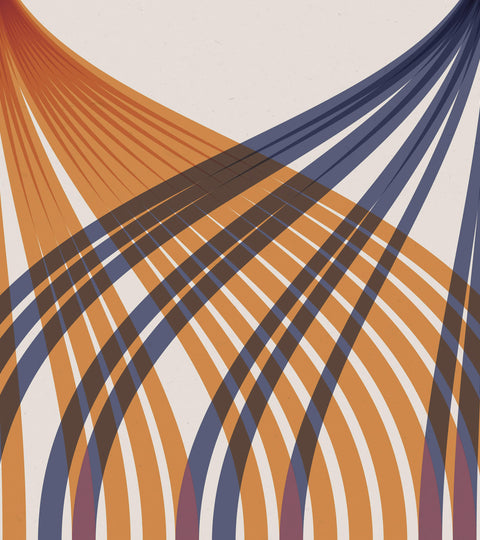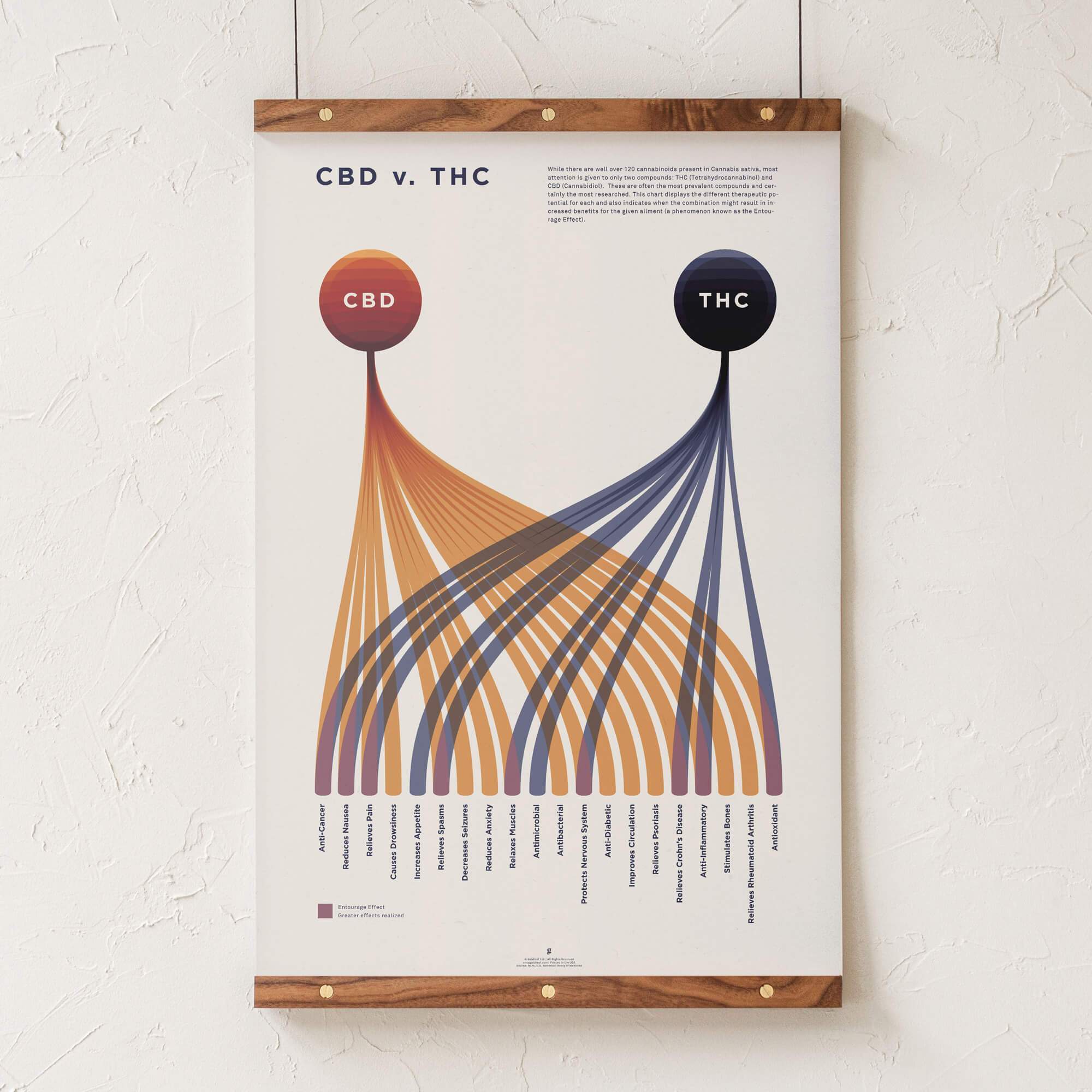Do I Really Need Both CBD and THC?
Table of Contents
- Introduction
- Understanding CBD, THC, and Other Cannabinoids
- CBD and its Therapeutic Properties
- The Entourage Effect
- CBD vs. THC Comparison Chart
- Reasons to Avoid THC
- A Caveat About CBD
- FAQ's and Answers
- Conclusion
Introduction
CBD, THC, CBG, CBN, CBDa, CBDv, THCa, THCv, etc. It’s easy to become confused by the veritable alphabet soup of cannabinoids.
All you need to know is that CBD is the cannabinoid that heals and THC is the cannabinoid that gets you high, right?
Well, kind of, but that’s only a starting point.
The Basics
While THC is perhaps most known for its psychoactive properties (i.e. it gets you high), it also offers numerous health benefits.THC is effective at relieving pain, reducing nausea and vomiting, suppressing muscle spasms, slowing the deterioration of your nervous system, reducing eye pressure, and acting as an antidepressant. These are only a few of the symptoms THC is effective in treating.
Like THC, CBD has many therapeutic properties which aid in the treatment of numerous conditions.
CBD is effective at inhibiting cancer cell growth, reducing blood sugar, relieving anxiety, slowing bacterial growth, and reducing inflammation. These are only a few of the many conditions for which CBD has been proven effective.
The Entourage Effect
There are several medical conditions that can be treated with both CBD and THC. These include chronic pain, depression, muscle spasms, and nausea.
While you can choose to treat any of these conditions with only THC or CBD, the entourage effect occurs when they’re coupled together.
The entourage effect is when multiple cannabinoids or terpenes work together to enhance the therapeutic effects of each cannabinoid. This applies not only to CBD and THC, but also to all 120 known cannabinoids.
Key Point: CBD and THC compound their therapeutic effects when taken in combination. You can see this concept illustrated in the following infographic where purple showcases the enhanced "entourage" effect.
Reasons To Avoid THC
Of course, though THC has far more to offer than just a high, it is not for everybody. There are several reasons why you may choose to utilize a CBD-only treatment. These include:
- You don’t enjoy the feeling of being "high." The psychoactive properties of THC can be powerful, especially when taken in large doses. Some people are averse to the perceived loss of control or just don’t like the sensation.
- You have to focus on your work. Some people have the ability to perform at or above standard while high; however, most of us fall short. If you have a condition that’s treated by both CBD and THC, you may wish to opt for a CBD-only preparation during your workday.
- You have to take drug tests. When applying for work, many jobs require drug tests. Additionally, some lines of employment frequently drug test employees because of the physically rigorous and/or protective nature of the position. Individuals with a history on the wrong side of the law may also face court-appointed drug testing while on parole. Many drug tests only screen for THC, although it’s a good idea to avoid all cannabinoids if you may potentially need to take a drug test. Even CBD preparations might have trace (or larger) amounts of THC or other cannabinoids like CBN that can make you fail a drug test.
- Your condition is only treated by CBD. Of the most studied cannabinoids, including THC, there are a few medical symptoms in which CBD is the only cannabinoid to have medical efficacy. If intestinal contractions are your sole medical concern, for example, your body may not require any other cannabinoids besides CBD.
A Caveat About CBD
With the increasing popularity and availability of CBD products throughout the United States, it should be noted that not all products work as advertised. Lack of regulation is a significant problem, one which Peter Pitts, president of the Center for Medicine in the Public Interest and a former FDA associate commissioner, described as “a maelstrom of false claims and shoddy quality standards.”
Although many CBD products are effective, some unscrupulous business owners have seized on the rising tide and brought poor quality products to market. We recommend that if you choose to obtain a CBD product that you make sure to do your homework prior to purchase.
Key Point: Utilizing reputable sources and the advice of trusted budtenders are some of the best ways to ensure you are purchasing a quality CBD product. Don't forget to check out our CBD Jotter Journal its an ideal companion for anyone who uses or plans to use CBD concentrates, edibles, or topicals and will work with both CBD-only products
FAQ's and Answers
- What are the therapeutic properties of THC?
- THC offers various health benefits in addition to its psychoactive effects. It is known to be effective in relieving pain, reducing nausea and vomiting, suppressing muscle spasms, slowing the deterioration of the nervous system, reducing eye pressure, and acting as an antidepressant.
- How does CBD inhibit cancer cell growth?
- CBD has shown potential in inhibiting cancer cell growth through various mechanisms, including inducing apoptosis (programmed cell death), inhibiting angiogenesis (formation of new blood vessels that support tumor growth), and preventing the spread and migration of cancer cells.
- What is the entourage effect?
- The entourage effect refers to the synergistic interaction of multiple cannabinoids, such as CBD and THC, along with other compounds like terpenes, working together to enhance their therapeutic effects. It suggests that using a combination of cannabinoids and terpenes can have a more significant impact than using them individually.
- Which medical conditions can be treated with both CBD and THC?
- Medical conditions such as chronic pain, depression, muscle spasms, and nausea can be effectively treated with both CBD and THC. The combination of these cannabinoids may provide enhanced therapeutic benefits.
- Are there any side effects of using THC?
- THC can have side effects, especially at higher doses or in sensitive individuals. Common side effects include impaired coordination, dry mouth, red eyes, increased heart rate, and short-term memory impairment. It's important to use THC responsibly and be aware of potential side effects.
- Can CBD products contain traces of THC?
- Yes, CBD products can contain traces of THC, particularly full-spectrum CBD products that retain other cannabinoids and terpenes present in the cannabis plant. However, the THC content is typically very low (less than 0.3% in legal CBD products in many jurisdictions).
- How can I ensure the quality of CBD products?
- To ensure the quality of CBD products, it's important to choose reputable sources and brands that prioritize transparency and quality control. Look for products that have undergone third-party testing to verify their potency and purity. Seek recommendations from trusted sources and consult with knowledgeable professionals, such as budtenders or healthcare practitioners.
- Are there any legal restrictions on CBD and THC?
- The legal status of CBD and THC varies depending on the country and jurisdiction. While CBD derived from hemp with low THC content is legal in many places, THC is still subject to stricter regulations due to its psychoactive nature. It's crucial to understand the legal framework and regulations in your specific location.
Conclusion
When it comes to cannabis, the whole is clearly greater than the sum of its parts.
Despite the fact that CBD and THC have many potent healing properties on their own, the combination of these two (and other) cannabinoids is the ideal course of therapy for many cannabis patients. CBD may have the widest known breadth of conditions treated among the cannabinoids, but THC is certainly no slouch in that regard either.
And, let’s not forget, the psychoactive properties of THC add a recreational overlay to your therapy. Not bad for a side benefit!


